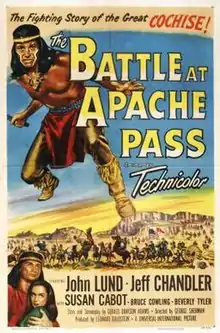The Battle at Apache Pass
The Battle at Apache Pass is an American Western film directed by George Sherman. The stars are John Lund as United States Army Maj. Colton and Jeff Chandler repeating the role of Apache chief Cochise, whom he played two years earlier in 20th Century Fox's Broken Arrow.[2] Jay Silverheels also reprised his role of Geronimo from the same film.
| The Battle at Apache Pass | |
|---|---|
 | |
| Directed by | George Sherman |
| Produced by | Leonard Goldstein |
| Written by | Gerald Drayson Adams |
| Starring | John Lund Jeff Chandler |
| Music by | Hans J. Salter |
| Cinematography | Charles P. Boyle |
| Edited by | Ted J. Kent |
| Color process | Technicolor |
Production company | Universal Pictures |
| Distributed by | Universal Pictures |
Release date |
|
Running time | 85 minutes |
| Country | United States |
| Language | English |
| Budget | $681,000 |
| Box office | $2 million (US rentals)[1] |
The film was rated as the #1 moneymaker in Variety magazine's list of box-office pictures, when it came out in April 1952.[3] The film is a highly fictionalized account combining the events of "The Bascom Affair" of 1861 and the "Battle of Apache Pass" of 1862, the first time that the Indians meet modern (for the age) artillery.
Plot
In 1862, as the Civil War rages in the Southeastern states, the Southwest is far away from the battle lines, but in New Mexico Territory, good relations between Fort Buchanan's commanding officer, Maj. Colton (John Lund), and Chiricahua Apache chief Cochise (Jeff Chandler) are threatened by the arrival of venal government agent Baylor (Bruce Cowling) and his equally dishonest scout Mescal Jack (Jack Elam).
In breach of existing treaties, Baylor plans to resettle the Apaches to the San Carlos Reservation, and when Geronimo (Jay Silverheels), the chief of the rival Mogollon Apaches, attacks the Tucson stagecoach and kills women and children, Baylor threatens to also transport the Chiricahuas to San Carlos. When confronted by Colton and Baylor, Cochise calls a council of Apache elders and they vote to banish Geronimo, who must also give up one of his stagecoach captives, schoolteacher Mary (Beverly Tyler). After assuring his pregnant wife Nona (Susan Cabot) that his interest in the attractive young schoolteacher is not romantic, Cochise brings Mary to Fort Buchanan and entrusts her to Maj. Colton, counseling him that she would be a fine wife.
At the same time Baylor and Jack plot with Geronimo to frame Cochise for Geronimo's attack on a ranch. During Colton's inquiry into the attack, his subordinate, Lt. Bascom (John Hudson), is promised a promotion by Baylor for rescuing the boy who was kidnapped during the attack. Cochise tells Bascom that it was Geronimo who committed the attack, but Bascom accuses him of lying and takes Nona hostage, while executing by hanging three braves, including Cochise's brother, Little Elk (Tommy Cook). As Cochise mourns and then prepares to retaliate against Bascom's position, Mescal Jack goes to him on the pretense of warning him about an Army attack, but Cochise calls him a liar and puts him to death. Colton's trusted Sgt. Bernard (Richard Egan) informs him of the situation, causing Colton to shut down Fort Buchanan and prepare to transfer everyone, including Mary and Baylor, to Fort Sheridan, a more secure redoubt, some distance away.
From the hills along the trail, Cochise watches the procession, as does Geronimo and, as shooting begins, the wounded Baylor goes towards the Indians' positions, shouting that he is their friend, but Geronimo kills him. Colton and Sgt. Bernard use the expedition's cannon to rout the warriors, as Cochise finds Nona, who has been hurt, and takes her to the wagons so that Army Dr. Carter (Regis Toomey) can treat her. Geronimo calls Cochise a weak leader, but in a one-to-one battle, Cochise wins and, instead of killing Geronimo, banishes him. Nona's son is born and Nona gives her friend Mary a precious Apache bracelet. Colton and Mary look at each other with affection and Cochise tells them that time has come for peace, as he rides away with Nona.
Cast
|
|
Production
The film was announced in June 1951.[4] Parts of the film were shot in Professor Valley, Ida Gulch, Courthouse Wash, Arches National Park, Colorado River, and Sand Flats in Utah.[5] In Great Britain in the 1950s the movie was represented by a multi-page article in The Western Film Annual (edited by F. Maurice Speed) featuring text and photos. Jay Silverheels was given the wrongly spelled name of Jay Silverhills.
Evaluation in film guides
Leonard Maltin's Movie Guide gives The Battle at Apache Pass 2½ stars (out of 4) indicating that "Chandler reprises his BROKEN ARROW role as Cochise". The Motion Picture Guide assigns it 2 stars (out of 5), describing it as "[N]ot the greatest western ever made, but interesting for its portrayal of Indians as rational human beings able to cooperate with the white man".
References
- 'Top Box-Office Hits of 1952', Variety, January 7, 1953
- Thompson, Howard [under byline: H.H.T.] (May 10, 1952). "NY Times review". New York Times. Retrieved 16 November 2008.
- "He Can Add". Time. April 28, 1952. Retrieved 16 November 2008.
- "Drama: Chandler Will Repeat Indian Cochise Part". Los Angeles Times. 5 June 1951. p. 16.
- D'Arc, James V. (2010). When Hollywood came to town: a history of moviemaking in Utah (1st ed.). Layton, Utah: Gibbs Smith. ISBN 9781423605874.
External links
- The Battle at Apache Pass at the American Film Institute Catalog
- The Battle at Apache Pass at IMDb
- The Battle at Apache Pass at AllMovie
- The Battle at Apache Pass at the TCM Movie Database
- The Battle at Apache Pass at TV Guide (1987 write-up was originally published in The Motion Picture Guide)
- Review of film at Variety